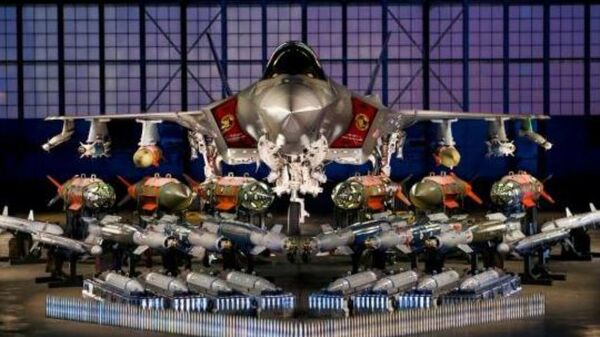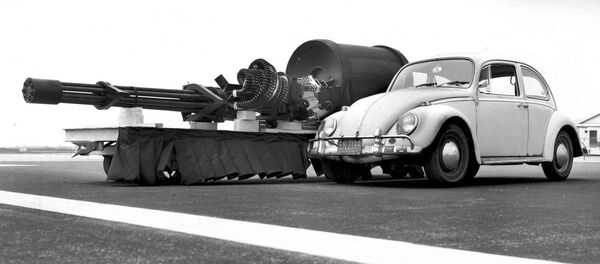Lockheed Martin has touted the F-35's ability to carry weapons under its wings as converting the fifth-generation jet into "Beast Mode."
According to newly captured footage by world-renowned photographer Frank Crebas, an F-35 was recently seen sporting four 500-hundred pound GBUs and a pair of AIM-9x air-to-air missiles on its external pylons, the Aviationist reported Thursday. The footage was snapped on July 27.
When the F-35 carries any weapons under its wings, it loses some of its stealth features, which are best enabled by keeping all of the weapons in the aircraft's internal weapons bay, the Aviationist reported.

The "Beast Mode" marketing tactic was partially debunked last December. Specifically, the Bethesda company's "Beast Mode" configuration claimed to put six GBU-31 JDAM guided bombs weighing 2,000 pounds each, two AIM-120 missiles and two AIM-9X Sidewinders onto an F-35 for a total of 10 weapons for mixed air-to-air and air-to-ground attack missions. But this configuration hasn't ever been tested, and the hardware to deploy it may not exist, a report found.
"The Joint Program Office and the aircraft's prime manufacture have a long history of making over simplified, misleading, absurdly positive and not fully accurate statements," The Drive demurred in a report bringing Lockheed's claims about "Beast Mode" down from fantasy land to reality.
When The Drive poked holes in Lockheed's initial vaporware pitch, it pointed out that F-35 is facing increasingly stiff competition from the F-15 in the sense that the F-15 does have a proven capability of carrying a relatively large number of weapons, which is becoming an especially attractive capability in the Pentagon's eyes.
Indeed, Israel and the US are reported to be exploring an advanced F-15X in light of the F-35's lethargic pace in getting off assembly lines without quality issues.
Notably the Dutch F-35s, training with US crews in California, were not carrying the 2,000-pound GBU-31 bombs. Nor were they carrying 14 beyond-visual-range missiles and two AIM-9X Sidewinders, for a total of 16 missiles, as Lockheed Martin initially marketed would be standard when the F-35 took on "Beast Mode" armaments for air-to-air only missions.
While the "Beast Mode" configuration may look intimidating, a bombshell government watchdog report found that a test designed to compare the F-35 and the A-10 Thunderbolt in close air support missions was rigged in favor of Lockheed's jet.
"The designers essentially created a laboratory demonstration to show how aircraft can hit non-moving targets in a sterile environment. This hardly represents the conditions when soldiers and Marines are locked in close combat with an enemy just yards away. In the worst-case, most urgent close-support scenario — the one in which these aircraft need to be tested — a small group of American soldiers are about to be overrun by a numerically superior enemy force with reinforcements too far away to help. Their only hope of survival is for an aircraft to appear overhead, raining deadly fire on the enemy soldiers, forcing them to take cover or retreat. Not one event during these four days of tests comes close to addressing or simulating this," the Project on Government Oversight (POGO) found.
The test was a sham, it reported in July. "Rather than telling us whether or not the F-35 can actually provide the kind of close support our ground forces need to survive and prevail, this grossly inadequate test has been designed to mislead."



